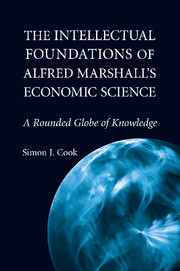Book contents
- Frontmatter
- Contents
- Acknowledgments
- List of Abbreviations
- Introduction
- PART I THE CONTEXTS OF MARSHALL'S INTELLECTUAL APPRENTICESHIP
- PART II DUALIST MORAL SCIENCE: 1867–1871
- 3 Mental Crisis
- 4 The Way of All Flesh
- 5 Political Economy
- PART III NEO-HEGELIAN POLITICAL ECONOMY: 1872–1873
- EPILOGUE: “A ROUNDED GLOBE OF KNOWLEDGE”
- Bibliography
- Index
- Titles in the series
- Frontmatter
- Contents
- Acknowledgments
- List of Abbreviations
- Introduction
- PART I THE CONTEXTS OF MARSHALL'S INTELLECTUAL APPRENTICESHIP
- PART II DUALIST MORAL SCIENCE: 1867–1871
- 3 Mental Crisis
- 4 The Way of All Flesh
- 5 Political Economy
- PART III NEO-HEGELIAN POLITICAL ECONOMY: 1872–1873
- EPILOGUE: “A ROUNDED GLOBE OF KNOWLEDGE”
- Bibliography
- Index
- Titles in the series
Summary
A “CRISIS IN HIS MENTAL DEVELOPMENT”
Marshall's early Cambridge career began “just at the date which will … be regarded by the historians of opinion as the critical moment when Christian dogma fell away from the serious philosophical world of England, or at any rate of Cambridge.” Such, at any rate, was the opinion expressed by John Maynard Keynes in his 1924 obituary memoir of Marshall in the Economic Journal. After his graduation from the Mathematical Tripos in 1865, Marshall briefly taught mathematics at Clifton public school, but then returned to Cambridge to take up coaching in mathematics. Upon returning to Cambridge, he came into contact with the world of the Cambridge moral sciences. In 1867 Marshall began attending the weekly meetings of the Grote Club, whose members were involved in the moral sciences. According to Keynes:
It was at this time and under these influences that there came the crisis in his mental development, of which in later years he often spoke. His design to study physics was (in his own words) “cut short by the sudden rise of a deep interest in the philosophical foundation of knowledge, especially in relation to theology.” … after a quick struggle religious beliefs dropped away, and he became, for the rest of his life, what used to be called an agnostic.
Keynes's concise and apparently informative account of Marshall's early “crisis” of “mental development” provides something of a challenge for the twenty-first-century historian of opinion.
- Type
- Chapter
- Information
- The Intellectual Foundations of Alfred Marshall's Economic ScienceA Rounded Globe of Knowledge, pp. 87 - 119Publisher: Cambridge University PressPrint publication year: 2009

